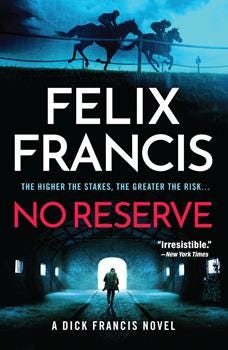NO RESERVE BY FELIX FRANCIS – REVIEW & APPRECIATION
A look at Felix Francis’s latest novel in his late father Dick Francis’s tradition.
NO RESERVE
Felix Francis
When you hear someone say, “Well, the writer’s just following a formula now,” you can be pretty certain that person has never tried writing a novel. Even with a so-called “formula,” it’s damned hard to get it right. That said, like all of his novels, Felix Francis's latest novel, NO RESERVE, contains all of the elements that his late father Dick Francis’s novels contained. It involves horse racing in some way. The first-person narrator is a male in his 30s (I can only remember one exception to this male protagonist, and it’s Felix’s PULSE, whose main character is a female physician. (I felt like it was less successful as a “Dick Francis” novel, but maybe more successful on its own footing describing a female physician with mental health issues who runs into trouble).
Often the hero of the Dick Francis novels was a jockey or former jockey, but not always. All the books deal in some way with horse racing. TO THE HILT, for example, is about a painter whose stepfather asks him to hide a racehorse. There’s usually a female love interest, some moderate personal problems that take second place to the predominant crime, and the violence rarely involves a gun.
NO RESERVE features Theo Jennings, an auctioneer for a bloodstock sales company in Newmarket, England. He auctions a yearling colt for a record 3 million guineas. He later overhears a conversation in the men’s room suggesting the sale was driven up on purpose for some sort of insurance scam. A day or so later, the colt is found dead. Theo is convinced there’s foul play, but can’t get anyone to believe him, even after someone apparently tries to kill him.
I found this novel compelling. Theo is sympathetic, and as far as I can tell, never was or is a jockey or even someone who’s ever ridden a horse. He is, however, stubborn and persistent, of course. The protagonist of a crime novel must not be blown by the whims of fate, but take action, even if it’s incredibly stupid to do so. The novel, like all of Felix and his father’s novels, provides plenty of inside details about some aspects of horse racing, horse breeding, horse transportation, and whatever else the novel is about, in this case, auctions and frauds. From my perspective, Dick Francis wrote about the creative process better than just about anyone in TO THE HILT and IN THE FRAME, both of which dealt with painters.
If you’re a mystery reader, you’ve undoubtedly heard of Dick Francis and possibly Felix Francis. Dick Francis passed away in 2010 at the age of 90. Felix had helped him write the last couple of his novels, and it was the world’s worst secret that Dick Francis’s novels were something of a family affair, with his wife Mary Francis acting as an editor and the family providing plenty of feedback and ideas. After about 10 novels on his own, I’m comfortable saying Felix is as good a writer as his father was and clearly understands the assignment in writing books that can be dubbed “Dick Francis novels.” Check them out.
Mark Terry
www.markterrybooks.com


